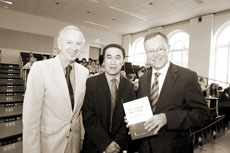


For universities in Lower Saxony, 2000 was dominated by discussions concerning the draft of the Gesetz zur Hochschulreform in Niedersachsen, the Lower Saxony University Reform Law. Both Council and Senate delivered opinions on this. In many subjects, it was soon possible to take the new bachelor’s and master’s degrees. The university started the accreditation of new degree programmes.
A new degree programme in industrial engineering was established jointly by the Departments of Economics and Management, Mechanical Engineering, Electrical Engineering, and Information Technology.
From 1 January 2001 to 31 December 2023, the University of Hannover was run as a state enterprise and received a block grant. The state and the university regulated their relationship through target agreements based on the principles of new public management. As the first building block of corporate design, the university adopted a new logo in 2001.
In October 2002, a new state university law, the Niedersächsisches Hochschulgesetz (NHG), was enacted. It was modified in 2007. The university remained a corporation under public law with the right to self-government. The Council was dissolved. The central organs were the Presidential Board and the Senate. The Hochschulrat, or University Council, was set up as an advisory body for the Presidential Board and the Senate.



In October 2003, the state government passed the Hochschuloptimierungskonzept (HOK). This optimisation concept led to the far-reaching restructuring of higher education in Lower Saxony. In addition to budget cuts and savings measures for the university, there were drastic changes for the University of Hannover’s Department of Education: teacher training for primary schools and secondary schools was transferred to Hildesheim. The Department of Law remained a legal training institute, but without the social science specialisation.
The Department of Romance Studies was phased out in its then form and reopened in 2012 with a Spanish Studies degree programme. The Diplom and Magister degrees were replaced by bachelor’s and master’s degrees.
In August 2005, the new university constitution came into force. Leibniz Universität was then no longer divided into departments but into nine faculties.
In 2006, the University of Hannover celebrated its 175th anniversary and was renamed Gottfried Wilhelm Leibniz Universität Hannover.



On 1 January 2009, the Niedersächsische Technische Hochschule (Niedersachsen Institutes of Technology, NTH) was established – an alliance of the three universities Technische Universität Braunschweig, Technische Universität Clausthal and Leibniz Universität Hannover. Its aim was to consolidate existing strengths, thereby increasing efficiency in research and teaching.



The “Leibniz-Stiftungsprofessur” (Leibniz Foundation Professorship) was established between 2010 and 2015 to demonstrate the special bond between the university, the city of Hannover and the polymath scholar Gottfried Wilhelm Leibniz.
In 2011, a Senate working group began reviewing the awarding and withdrawal of academic titles at the former Technische Hochschule Hannover (Technical University of Hannover) during the Nazi regime in order to comprehensively understand the role played by the university’s predecessor institution during the National Socialist period. On 20 November 2013, Leibniz University Hannover held a commemorative ceremony in memory of all those who suffered as a result of restrictions and denigration at the former Technische Hochschule Hannover during the Nazi regime. The event was based on the results of the Senate working group, which presented its report to the relatives of the affected persons, university members and members of the public for the first time.


 ©
Marie-Luise Kolb/LUH
©
Marie-Luise Kolb/LUH
A second part of the review process was dedicated to the period after 1945 and initiated an investigation into the National Socialist affiliations of the professors employed at the Technische Hochschule Hannover after 1945, with special attention given to the rectors and senate members.
In 2016, the Leibniz School of Education was established, with a cross-faculty structure equivalent to a faculty. The goal was to further develop the teaching-related degree programmes, to strengthen education research and to generate more visibility for the topic by linking the national and international levels.



In 2019, the new Mechanical Engineering campus in Garbsen was inaugurated.
European University: In November 2023, Leibniz University Hannover became part of the European Union-funded university alliance EULiST – European Universities Linking Society and Technology. LUH initiated the strategic alliance with nine partners based in Finland, France, Greece, Italy, Austria, Sweden, Spain, Slovakia and the Czech Republic.
On 1 January 2024, sponsorship of the university was transferred to a foundation under public law, which means that LUH is no longer sponsored by the state of Lower Saxony. LUH is taking advantage of an option established in the Lower Saxony Higher Education Act that gives universities in Lower Saxony more independence.








